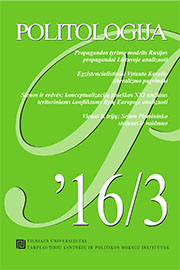Propagandos tyrimo modelis rusijos propagandai lietuvoje analizuoti
A propaganda research model for the analysis of Russian propaganda in Lithuania
Author(s): Darius Buinauskas, Vytautas Keršanskas, Laurynas KasčiūnasSubject(s): Social Philosophy, Political Sciences, Communication studies, Recent History (1900 till today), Politics and society, EU-Approach / EU-Accession / EU-Development
Published by: Vilniaus universiteto leidykla & VU Tarptautinių santykių ir politikos mokslų institutas
Summary/Abstract: In this article, we discussed a definition of propaganda and overviewed the evolution of this phenomenon in the 20th–21st centuries. There is no single approach towards what is propaganda. Therefore, the Authors of this article use the definition of propaganda introduced by Garth Jowett and Victoria O’Donnell: “Propaganda is the deliberate, systematic attempt to shape perceptions, manipulate cognitions, and direct behaviour to achieve a response that furthers the desired intent of the propagandist”. Within this article we look at how propaganda works, what are its main characteristics and goals. We conclude that the model introduced by Jowett and O’Donnell may be applied in the research of interstate informational campaigns. Considering the structure of Russian propaganda, the proposed model adaptation divides it into three stages: the analysis of situation, process and results. The first stage involves the analysis of the propagandist and one’s context of propaganda. The main goal is to realise how propaganda is spread, what kind of an ideological approach it employs and what are the aims of propagandist. The analysis of a situation includes the fundamental aspects of the main propaganda target. Therefore, this analysis provides a good base for further research. A well done first phase analysis provides sufficient assumptions on new case research in the future and a repeated analysis of the first phase is only needed if one of the main objects has changed. The main objective of the second stage is to find a specific case of propaganda and information warfare. It is also important to trace the targeted audience. This significantly contributes in recognising and evaluating the techniques used by a propagandist and how the targeted audience react to them. The steps of process analysis may be repeated in order to investigate a new propaganda campaign. The third stage is dedicated to analysing the state after the informational attack. It is important to evaluate the strategy that was taken to counter any of the propaganda and damage that was dealt to the state. Received results are important in formulating the map of propaganda. This article suggests a propaganda research model to analyse Russian propaganda in Lithuania. However, the model still requires a case-study grounding; therefore, further studies should be conducted in this regard.
Journal: Politologija
- Issue Year: 2016
- Issue No: 3 (83)
- Page Range: 3-40
- Page Count: 38
- Language: Lithuanian

